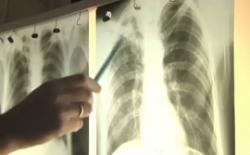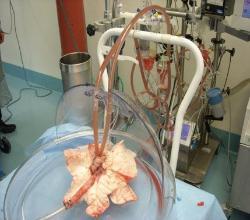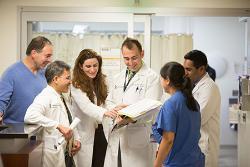Program in Lung Healing Research
Seeking a Fundemental Change in Established Therapies for Patients with Respiratory Failure
Improving the process of lung healing

Too often the lung "heals" from injury by replacing itself with a scar, as the end result of the pro inflammatory process that drives fibrocytes to replace functional lungs with fibrin. Our scientific approaches include the use of stem cell therapy, tissue engineering, personalized diagnostics and new technology platforms being developed for artificial respiration. Discoveries are focused on increased availability of donor organs, continued exploration of the benefits and challenges of treating the most ill candidates, and of newer immune suppression regimes that will improve rates of survival 10 years and beyond.
Increasing transplant tolerance
Nearly all transplant patients must deal with rejection, the body’s immune reaction to a new organ. Can we accomplish tolerance without need for chronic immunosuppression? University of Maryland lung transplant scientists have embarked on a numerous translational lung transplant research projects seeking to accomplish lung transplant tolerance and provide durable lung recipient survival with little or no need for chronic immunosuppression beyond the period right around the transplant. Clinical trials of tolerance induction approaches developed by this team are expected to reach our patients by 2017.
Resolving the shortage of donor lungs

Maryland is a leader in testing an innovative method to help increase the pool of available donor lungs called ex-vivo lung perfusion (EVLP). Every year, nearly a quarter of lung transplant candidates in the U.S. die before they can get a transplant. A major reason for the shortage is that 80 percent of donor lungs are not suitable for transplant. EVLP is a healing process that rehabilitates damaged lungs. Maryland is one of six sites in the country participating in an FDA trial of EVLP. So far researchers at Maryland have transplanted nine sets of lungs renewed by EVLP; the patients have had no complications related to the lung healing process. Find Out More >>
If lungs from animals could be safely used in people, the shortage of donor lungs would be resolved. Transplantation of organs from other species into man ("xenotransplantation") is currently prevented by bio-incompatibility, immune and other biochemical differences that cause rapid injury of animal organs placed in a human blood environment. The University of Maryland lung xenotransplant team is a world leader in these efforts to identify and overcome remaining barriers. The team tests new genetic approaches and drug treatments in a variety of test systems designed to evaluate long-term life-supporting performance of pig lungs and other organs.
With advances in tissue engineering, we propose to regenerate human lungs from de-cellularized human lungs and appropriate lung stem cells. Striking progress has been made in the area of engineering human organs. Remarkable images of a non-human beating heart and of ventilated lungs that have been “grown” in the laboratory have excited the field.
Providing ambulatory artificial lung ventilation
How do we improve the comfort and outcomes of individual patients requiring heart or lung machines? University of Maryland physicians were the first in the world to free a patient from a mechanical ventilator allowing the patient to walk with the aid of an ambulatory artificial lung device. Two weeks later the patient received donor lungs.
Our Artificial Organs Laboratory has established a national reputation for the design and development of blood pumps for heart failure and for originating biocompatible artificial lung prototypes. Our team has been struck and perplexed by widely and, as yet, difficult to predict outcomes in seemingly similar patient groups. We propose genomic differences may explain variation in response to the artificial lung. As machines are being imagined to replace lung function, they must be designed by our evolving understanding of applied bioengineering principles to promote biocompatibility to reduce damage to its formed cells

Optimizing care for patients with acute lung injury
The UM SOM is widely recognized for its significant research and discovery in the field of pulmonary medicine. Faculty in the Pulmonary & Critical Care Division, along with faculty in the UM SOM Departments of Surgery and Anesthesiology, have participated in the NIH-funded ARDSNet (Acute Respiratory Distress Syndrome Clinical Research Network) for over two decades. ARDSNet studies have tested various approaches to ventilation, fluid support, optimal nutrition, and existing medications including statins and pentoxyphylline. Additional clinical research is focused on optimizing supportive care in patients with acute lung injury and developing new therapies that block lung injury. The Division has received international recognition in the field of thermobiology, the study of how shifts in temperature during health and disease impact on acute lung injury and recovery.
